Browse Items (1611 total)
| Thumbnail | Title | Description | Date | Date Added |
|---|---|---|---|---|
 |
Tomea Kirchoff Oral History Interview | This oral history interview with Tomea Kirchoff was part of oral histories conducted in the fall 2001 semester of History 447: Oral History. Tomea Loman Kirchoff speaks about her childhood, particularly her education, learning English, and her father’s employment at American Steel in Granite City. She discusses the Community Center as well as the Bulgarian-Macedonian Church located in Lincoln Place, as well as other aspects of Macedonian culture that she had experience with. Mrs. Kirchoff additionally speaks to World War II and contributions that women in Lincoln Place made to the war effort. |
October 29, 2001 | March 14, 2018 |
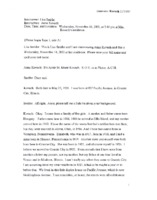 |
Anne Kovach Oral History Interview | This oral history interview with Anne Kovach was part of oral histories conducted in the fall 2001 semester of History 447: Oral History. Anne Kovach was born in Macedonia in 1907 and immigrated to the United States with her father as a young child and has lived in Lincoln Place for most of her life. In this interview, she talks about her father’s career as an American Steel employee and saloon owner, the grocery store she owned with her husband, the education of girls learning English as a second language, the sowing girls did for the war effort during World War II, the Bulgarian-Macedonian Ladies Aid Society, and the Cyril and Methody Bulgarian-Macedonian Church in Lincoln Place. |
October 29, 2001 | March 14, 2018 |
 |
Dena Lovacheff Oral History Interview | This oral history interview with Dena Lovacheff was part of oral histories conducted in the fall 2001 semester of History 447: Oral History. Though Dena Lovacheff did not grow up in Lincoln Place, she moved there in 1951 when she married her husband, William Lovacheff, and resided there until 1988. In this interview, she describes her childhood, the family-run business called Louie’s Market, and living with her in-laws in the Lincon Place community. |
November 29, 2001 | March 15, 2018 |
 |
Andreas Matoesian Oral History Interview | This oral history interview with Andreas Matoesian was part of oral histories conducted in the fall 2001 semester of History 447: Oral History. Mr. Matoesian is a first-generation American. His father emigrated from Armenia in 1920 and settled in Lincoln Place Granite city. He related a story about his father’s experience coming through Ellis Island. His mother emigrated a little earlier and first lived in Davenport Iowa and then Lincoln Place after they were married. Mr. Matoesian was born in Lincoln Place in 1937 and lived there for 21 years. Mr. Matoesian is a Judge in Madison County Illinois. He worked his way through school as a barber in his father’s barbershop in Lincoln Place. Mr. Matoesian voiced memories about going to the community center in somewhat of a pre-school or day school setting during his pre-school years. He further related, during his grade school years that all of the teachers were very nice. He states that as an adult he found that they, the teachers, had been handpicked due to their sensitivity to the diverse ethnic group. Mr. Matoesian states that he feels that sports is the great levelizer. Being active in sports allowed people to break through other barriers. Mr. Matoesian states that he feels the exposure to multiple ethnic groups made him a more tolerant person, a person more accepting and appreciative of differences. Mr. Matoesian and I spoke briefly about the Armenian Genocide and his thoughts on the lack of publicity and acknowledgement of this horrific event. |
October 11, 2001 | March 15, 2018 |
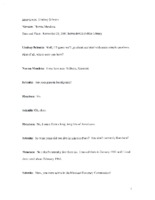 |
Norma Mendoza Oral History Interview | This oral history interview with Norma Mendoza was part of oral histories conducted in the fall 2001 semester of History 447: Oral History. Norma Mendoza moved to Lincoln Place after she got married in 1960 and lived there until 1966. In this interview, she describes her experience working with the Mexican Honorary Commission, the diversity of the community, food and entertainment within the community, arranged marriages, different aspects of her career, and the local army depot. |
November 28, 2001 | March 15, 2018 |
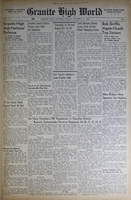 |
"Granite High World" School Newspapers for the 1940-41 School Year | This volume is a collection of the 14 editions of the Granite High World, the newspaper of Granite City High School, published in the 1940-41 school year. For yearbooks throughout the rest of the 20th and early 21st centuries, see Granite City Yearbooks published online by the Six Mile Regional Library. |
October 4, 1940 to May 22, 1941 | March 15, 2018 |
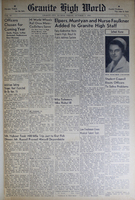 |
"Granite High World" School Newspapers for the 1941-42 School Year | This volume is a collection of the 13 editions of the Granite High World, the newspaper of Granite City High School, published in the 1941-42 school year. For yearbooks throughout the rest of the 20th and early 21st centuries, see Granite City Yearbooks published online by the Six Mile Regional Library. |
October 3, 1941 to May 1, 1942 | March 15, 2018 |
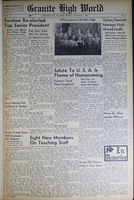 |
"Granite High World" School Newspapers for the 1942-43 School Year | This volume is a collection of the 14 editions of the Granite High World, the newspaper of Granite City High School, published in the 1942-43 school year. For yearbooks throughout the rest of the 20th and early 21st centuries, see Granite City Yearbooks published online by the Six Mile Regional Library. |
October 2, 1942 to May 21, 1943 | March 15, 2018 |
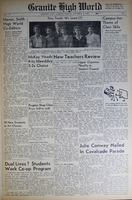 |
"Granite High World" School Newspapers for the 1943-44 School Year | This volume is a collection of the 14 editions of the Granite High World, the newspaper of Granite City High School, published in the 1943-44 school year. For yearbooks throughout the rest of the 20th and early 21st centuries, see Granite City Yearbooks published online by the Six Mile Regional Library. |
October 8, 1943 to May 19, 1944 | March 16, 2018 |
 |
Charles Merzian Oral History Interview | This oral history interview with Charles Merzian was part of oral histories conducted in the fall 2001 semester of History 447: Oral History. Mr. Charles Merzian is a second generation American. His father emigrated from Armenia in 1910, and his mother emigrated from Armenia shortly later. They were married in 1925 and became naturalized American citizens in 1945 and 1946 respectively. They had two children, Charles (born in 1928) and Nell (born in 1933). In this interview, Mr. Merzian describes life while growing up in Lincoln Place in two primary locations for socialization, the community center (the clubhouse) and Sim’s place (later honored as Sim’s college), and how they impacted the lives of virtually everyone living at Lincoln Place. Mr. Merzian stresses that the multi-ethnic relationships established when growing up were a definite asset in preparing him for his working career. |
November 1, 2001 | March 16, 2018 |
